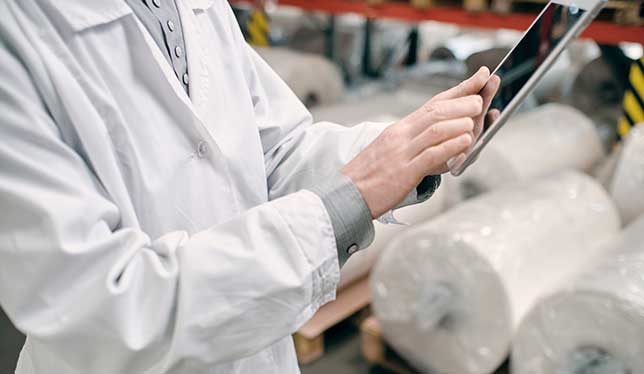Sustainable science: the future of high-quality research
The scientific community needs to talk about the sustainability implications of our research practices and start implementing approaches to minimize our professional carbon footprint.

This is a guest post from Sarah Ruediger. Dr. Ruediger is currently completing her postdoctoral research at the University of California San Francisco and the Howard Hughes Medical Institute. She studied molecular biology at the University of Basel in Switzerland, and completed her doctoral training at the Friedrich Miescher Institute for Biomedical Research. Her research focuses on the structure and function of brain circuits and how defined brain circuit elements underlie the emergence of perception and behaviour in both health and disease. In her next career stage, she will launch her research group at the University College London in early 2023. Dr. Ruediger aims to actively contribute to improving research culture and public enthusiasm for science, including the content creation for The Black Hole.
News about record-breaking heat waves, drought, wildfires, storms and floods are quickly becoming the new norm. While scientists are well positioned to understand the growing data highlighting the emerging climate crisis, many of us lab-based researchers have overlooked how our day-to-day research practices contribute to the problem. From a theoretical perspective, it is clear what needs to be done: we need to reduce greenhouse gas emissions.
In practice though, the research community still needs to fully recognize how and to what extent our research activities (from running experiments to travelling to meetings) contribute to the problem. Many types of research have significant environmental costs ranging from experimental resources to the energy needed to maintain supply chains, lab infrastructure, and data storage. As a community, we need to start talking about sustainability as an essential aspect of high-quality science and develop strategies that allow researchers to reduce their professional carbon footprint.
How can we make labs more green?
The total environmental impact of research practices has yet to be determined across many fields. This is mainly due to the limited availability of Scope 3 emissions data, including indirect emissions such as supply-chain operations. Regarding direct operations, research labs use about three to 10 times more energy per square metre than a typical office space. We also know that ventilation systems and lab equipment are two major sources of energy consumption within labs. Therefore, simple steps such as closing the fume hood sash or turning off equipment are low-hanging fruit that allow researchers to save energy easily.
The overall sustainability of equipment also depends on additional factors such as operation and disposal costs. Ideally, equipment should be maintained and repaired to reduce the need for new purchases. When no longer needed, the equipment can be donated or resold to maximize its usage throughout its lifetime.
Biomedical research methods frequently involve single-use consumables from synthetic plastic derived from crude oil, natural gas or coal. These short-lived plastic items typically end up in a landfill or incinerator, further negatively impacting the environment. It is estimated that life scientists alone produce about 5.5 million tons of plastic waste annually, which accounts for approximately two per cent of the plastic waste produced worldwide. While safety, cross-contamination and throughput must be considered, labs need to make a concerted effort to move to reusable consumables wherever and whenever possible.
Data in science are ever-growing, and it is therefore unsurprising that scientific computing and the associated increase in energy demand are critical factors driving carbon costs in research. Big Data centres already contributed to two per cent of global carbon emissions in 2017, and their carbon footprint continues to grow. While computer scientists and engineers are developing more energy-efficient computing hardware and software solutions, the research community needs to consider the carbon footprint associated with existing methods for data acquisition, storage, analysis and sharing.
For example, different data storage media have markedly different energy costs. Some data repositories run exclusively on renewable energy, whereas others still rely on fossil fuels. Data management and good practice that optimizes analysis code and minimizes the re-running of extensive data analyses can also lower the overall carbon footprint of research projects. In the future, data management and sharing will likely become two essential considerations in the research design and data dissemination strategy.
How are institutions dealing with this?
Many institutions started to launch programs that help scientists improve the sustainability of their research operations. For example, the LEAF program (Laboratory Efficiency Assessment Framework) is a self-assessment tool that helps labs implement a standardized list of actions to mitigate the environmental impact of operations based on the above-outlined issues. LEAF is currently in use at 70 institutions across the globe. Other initiatives, such as the Laboratory Efficiency Action Network, My Green Lab and Sustainable Labs Canada, can also serve as valuable resources to guide actions to reduce the environmental impact of laboratory research.
At the institutional level, bold actions are needed and organizations must continue to push to hit NetZero Carbon targets. At the Times Higher Education Climate Impact Forum, over 1,000 universities from 68 countries made commitments to reach net-zero emissions by 2050. While these programs represent big investments for universities, they also offer an opportunity to bring researchers, policymakers and practitioners together to catalyze change at the level of large enterprises and spur the transition to a low-carbon economy.
What about us as individuals?
Beyond the lab, a researcher’s professional carbon footprint is mainly driven by long-distance air travel to scientific conferences, meetings and workshops. A case study estimated that around 75 per cent of the carbon emissions associated with a single four-year PhD derive from general mobility. Videoconferencing could have reduced the climate-change impact on this case PhD by around 40 per cent. To put these numbers in relation, skipping a single round trip transatlantic flight saves more carbon than eating a plant-based diet for an entire year.
Scientists can choose to fly less and attend more meetings that can be reached using transportation with a much smaller carbon footprint, such as trains or carpooling. The scientific community can also host international conferences in a virtual or hybrid meeting format to significantly reduce the carbon footprint. Importantly, virtual meetings also promote equity and diversity as they minimize accessibility barriers, such as the financial cost of conference attendance and time away from home. In the long term, researchers can use their voices to advocate for sustainability in their institutions and through funding panels, which can increasingly consider sustainability an important factor in evaluating high-quality science. Lastly, scientists can reach out to their local political representatives and contribute to developing new policies and coordinated actions through their influence in the public sphere.
Talking about the sustainability implications of our research practices and implementing approaches to minimize our professional carbon footprint are two first important steps to facing the inconvenient truth of how our actions as a scientific community contribute to the climate crisis and, ultimately, the future of humanity. The time to act is now and together we can do this.
Featured Jobs
- Psychology - Assistant Professor (Speech-Language Pathology)University of Victoria
- Veterinary Medicine - Faculty Position (Large Animal Internal Medicine) University of Saskatchewan
- Business – Lecturer or Assistant Professor, 2-year term (Strategic Management) McMaster University
- Canada Excellence Research Chair in Computational Social Science, AI, and Democracy (Associate or Full Professor)McGill University














Post a comment
University Affairs moderates all comments according to the following guidelines. If approved, comments generally appear within one business day. We may republish particularly insightful remarks in our print edition or elsewhere.